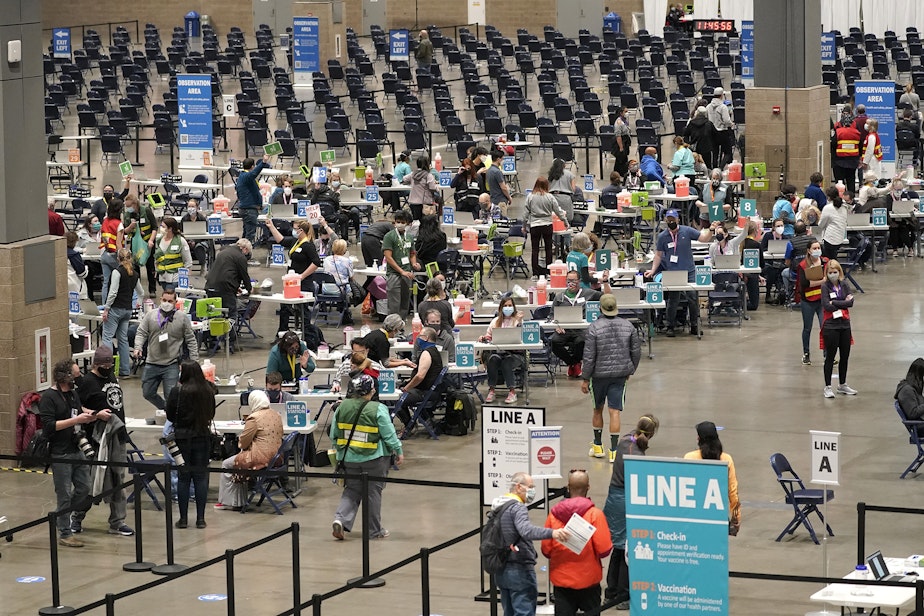Eligible for a vaccine in Seattle but unable to get one? It might be your ZIP code

A
s Covid-19 vaccines rolled out nationally and locally, reports emerged of wealthy white people traveling to working class neighborhoods and communities of color to get vaccinated, filling appointments intended for groups considered most vulnerable to severe Covid-19 outcomes.
In Seattle, city officials have tried to level the playing field by quietly enacting their own vaccine priority standards, within Washington state’s eligibility framework.
Instead of taking a first-come, first-served approach, the city says it is prioritizing Black, Indigenous, and people of color, older adults who haven’t been vaccinated yet, as well as people living within ZIP codes hardest hit by Covid, as identified by the University of Washington’s Social Vulnerability Index map.
But the city’s attempt to make vaccine access more equitable has caused some confusion for thousands of residents signed up on Seattle’s vaccine waitlist.
Community-based groups primarily serving communities of color are the first to receive appointment-booking access as the city gets new vaccine supply. These organizations then have seven days to reserve as many slots as they can for pop-up clinics, before the city sends out a temporary registration link to other vaccine-eligible people the city considers priority.
Thus far, the city has hosted 16 pop-up clinics with community-based organizations, including NAACP Seattle-King County, El Centro de la Raza, and the Urban League of Metropolitan Seattle.
Mayor Jenny Durkan said the city’s approach to vaccine equity is tied to demands made during protests last summer for a greater concentration of city resources in communities of color.
“We saw last summer that so many people stood up and demanded that we really recommit ourselves to show that Black lives matter, and that we treat our [Black, Indigenous, and communities of color] communities and give them the same opportunities that everyone is entitled to,” Durkan said during a press conference Friday morning.
"We have to recommit ourselves and we know that these clinics are so important to making sure that we can reach communities that have been denied that same access.”
But the vaccine appointment links the city sends out are often circulated beyond the targeted groups and posted on social media, including in the Seattle Vaccine Hunters Facebook group.
Kelsey Nyland with Mayor Jenny Durkan’s office said in an email that when links are posted to social media, “people with privilege and access” secure appointments immediately, leaving behind the city’s targeted groups.
“Unfortunately, we’ve seen a significant increase in ‘vaccine hunters’ posting our links on social media since the state announced that everyone 16 and older is eligible for a vaccine,” Nyland said. “This strips the city of our ability to focus on vulnerable populations, and also increases the likelihood that ineligible people can register for a vaccine appointment.”
In response, the city started changing the appointment links every few days. KUOW located five of these appointment links circulting on the Seattle Vaccine Hunters Facebook page.
Someone who clicks on an expired link may not know it has expired — they'll encounter the same "no appointments available" message that they would see if an active link ran out of appointment slots.
Meanwhile, all four of the city’s community vaccination sites are operating thousands below capacity. At full capacity, the city could administer 174,400 doses per week across its four major vaccine hubs in Rainier Beach, West Seattle, North Seattle, and at Lumen Field. But that would require a significant boost in vaccine supply from the federal government, Durkan said.
Renee Rassilyer-Bomers with Swedish hospital, which is partnering with the city to operate the Lumen Field site, said officials initially hoped to reach the 22,000 daily vaccination capacity by the end of April. Currently, there are about 140,000 people on Seattle’s notification list waiting to hear back.
“If we operated at maximum capacity, we could vaccinate everyone on our list in just one week," Nyland said.
The city has administered shots to more than 58,000 people, or roughly 8% of the city’s population. That doesn’t include those who have traveled out of town for vaccines.
City officials say that people signed up on Seattle’s vaccine notification “should not expect to be notified every week” and are encouraging people to seek out other providers if they can find appointments.
“If you have the opportunity to get vaccinated in another place, take it,” Mayor Jenny Durkan told KUOW’s The Record.
And that’s exactly what Seattleites have been doing — driving in droves to outside cities for the coveted vaccine. More recently, people have posted on social media, their experience traveling nearly 150 miles away to a FEMA site in Yakima where no one, eligible or not, has been turned down — so far.
RELATED: Thousands flock to Yakima mass vaccination site
Some of these vaccine sites are outperforming the city of Seattle’s largest vaccination site — Lumen Field, the Seahawks stadium site. A little drug store on Whidbey Island has given 35,000 shots to date, while at Lumen Field, 29,461 shots have been administered. However, Lumen Field isn't operating on a daily basis.
Mayor Durkan made a media appearance at Lumen Field on Monday, touting that the site was vaccinating an all-time daily high of almost 8,000 people, out of the full 22,000 daily vaccination capacity.
In the meantime, officials are urging people to continue social distancing, masking up, and taking other coronavirus precautions as we inch toward the other side of the pandemic.
“We are so close — people cannot put their guard down,” Durkan said. “We're seeing [Covid cases] go up because people are tired. They're coming together with friends in ways they shouldn't. They're feeling like, ‘Okay, we're almost there.’ And this is the time where we’ve really got to double down on being careful, being safe, protecting each other because we’re so close.”





